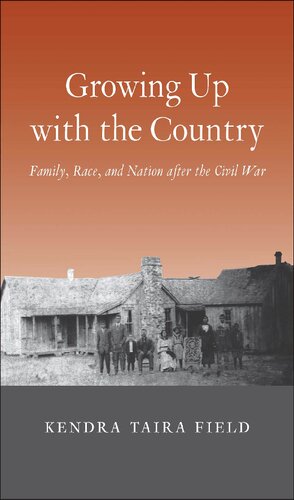
Growing Up with the Country
Family, Race, and Nation after the Civil War
کتاب های مرتبط
- اطلاعات
- نقد و بررسی
- دیدگاه کاربران
نقد و بررسی

November 27, 2017
Field, director of the Center for the Study of Race and Democracy at Tufts University, debuts with an important work of American history drawn from her personal family history. In the second half of the 19th century, three of Field’s ancestors—Thomas Jefferson Brown, Monroe Coleman, and Alexander “Elic” Davis—left the postemancipation South for Indian Territory (Oklahoma) searching for freedom. Field cogently argues that the lives of her relatives and the tens of thousands of freed people who moved west between 1865 and 1915 expose the “deeply transnational and multiracial dimensions of freedom’s first generation.” She skillfully portrays the interaction of freed people with Native Americans in Oklahoma to reveal the links among national identification, racial constructions, and class divisions. Some freed people used marriage to Native Americans to distance themselves from an oppressive history and to gain access to land, a source of stability and independence. Some pushed Congress to create a “black state” within the Oklahoma territory. The story that Field relates regarding the 1913–1915 Chief Sam back-to-Africa movement is exceptionally fascinating. Readers looking for an innovative hybrid of history and memoir won’t find that here; rather, Field’s family history further enriches her fine scholarly work. Maps & Illus.

Starred review from December 1, 2017
Field (director, Ctr. for the Study of Race and Democracy, Tufts Univ.) splendidly traces three families of former slaves and their successive and often harrowing migrations from the South in the years following emancipation. Between 1865 and 1915, former slaves experimented in land ownership, town building, and emigration to the Mississippi Delta and beyond. But access to land was hindered by Jim Crow segregation, racially motivated land allotments, disfranchisement, vigilantism, debt peonage, and oil speculation. Thomas Jefferson Brown, Monroe Coleman, and Alexander "Elic" Davis became victims of these conditions, and would eventually join Chief Alfred Sam's ill-fated 1914 Back-to-Africa movement. In telling the story of her ancestors, Field relies on family lore, storytelling, and archival research. She concedes that "History may be the enemy of memory," as historian Richard White has written, but agrees that "there are regions of the past that only memory knows." Despite criticism of Chief Sam's ventures by Booker T. Washington and W.E.B. DuBois, Field offers a reasoned defense of the Back-to-Africa movement in her epilog. VERDICT A masterpiece in the areas of personal narration, family genealogy, and African American historiography. Highly recommended for U.S. Civil War/Reconstruction and African American scholars and enthusiasts, genealogical specialists, and all readers.--John Carver Edwards, formerly with Univ. of Georgia Libs.
Copyright 2017 Library Journal, LLC Used with permission.

























دیدگاه کاربران